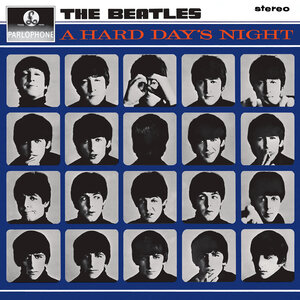
A Hard Day's Night is the third studio album by the English rock band the Beatles, released on 10 July 1964 by Parlophone, with side one containing songs from the soundtrack to their film of the same name. The American version of the album was released two weeks earlier, on 26 June 1964 by United Artists Records, with a different track listing that included selections from George Martin's film score. In contrast to the Beatles' first two albums, all 13 tracks on A Hard Day's Night were written by John Lennon and Paul McCartney, showcasing the development of their songwriting partnership.

Help! is the fifth studio album by the English rock band the Beatles and the soundtrack to their film of the same name. It was released on 6 August 1965. Seven of the fourteen songs, including the singles "Help!" and "Ticket to Ride", appeared in the film and take up the first side of the vinyl album. The second side includes "Yesterday", the most-covered song ever written. The album was met with favourable critical reviews and topped the Australian, German, British and American charts.

"Get Back" is a song recorded by the English rock band the Beatles and Billy Preston, written by Paul McCartney, and credited to the Lennon–McCartney partnership. It was originally released as a single on 11 April 1969 and credited to "The Beatles with Billy Preston". The song is one of the few examples of John Lennon featuring prominently as lead guitarist. The album version of this song contains a different mix that features a studio chat between Paul McCartney and John Lennon at the beginning, which lasts for 20 seconds before the song begins, also omitting the coda featured in the single version, and with a final dialogue taken from the Beatles' rooftop concert. This version became the closing track of Let It Be (1970), which was released just after the group split up. The single version was later issued on the compilation albums 1967–1970, 20 Greatest Hits, Past Masters, and 1.

My Generation is the debut studio album by English rock band the Who, released on 3 December 1965 by Brunswick Records in the United Kingdom, and Festival Records in Australia. In the United States, it was released on 25 April 1966 by Decca Records as The Who Sings My Generation, with a different cover and a slightly altered track listing. Besides the members of the Who, being Roger Daltrey (vocals), Pete Townshend (guitar), John Entwistle (bass) and Keith Moon (drums), the album features contributions by session musician Nicky Hopkins (piano).

Best of Bee Gees is a 1969 compilation album by the English-Australian rock band Bee Gees. It was their first international greatest hits album. It featured their singles from 1966–1969 with the exception of the band's 1968 single "Jumbo".
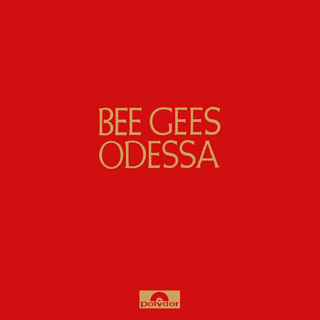
Odessa is the sixth studio album by the Bee Gees, a double vinyl LP released in February 1969, initially in an opulent red flocked cover with gold lettering. Despite reaching the UK Top Ten and the US Top 20, the album was not particularly well-received, though now is regarded by many as the most significant of the group's Sixties albums. An ambitious project, originally intended as a concept album on the loss of a fictional ship in 1899, it created tension and disagreements in the band regarding the work's direction; finally, a dispute over which song to release as a single led to Robin Gibb temporarily leaving the group.

"Your Song" is a song written by British musician Elton John and lyricist Bernie Taupin, and performed by John. It was John's first international Top 10 chart single.
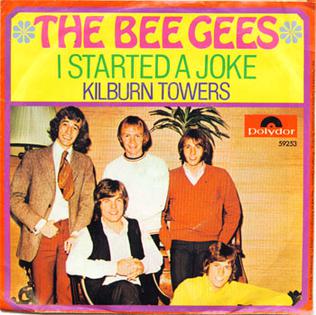
"I Started a Joke" is a song by the Bee Gees from their 1968 album Idea, which was released as a single in December of that year. It was not released as a single in the United Kingdom, where buyers who could not afford the album had to content themselves with a Polydor version by Heath Hampstead. This is the last Bee Gees single to feature Vince Melouney's guitar work, as he left the band in early December after this song was released as a single.
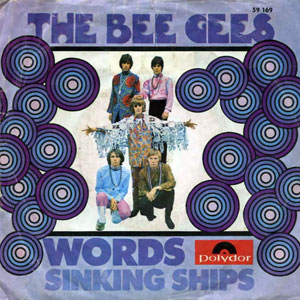
"Words" is a song by the Bee Gees, written by Barry, Robin and Maurice Gibb. The song reached No. 1 in Germany, Canada, Switzerland, and the Netherlands.
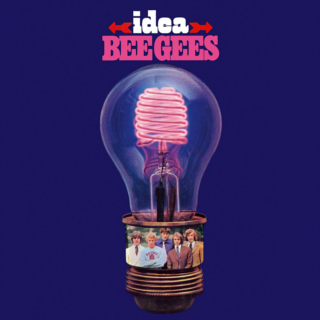
Idea is the fifth album by the Bee Gees. Released in September 1968, the album sold over a million copies worldwide. The album was issued in both mono and stereo pressings in the UK. The artwork on the Polydor release designed by Wolfgang Heilemann featured a "beehive" neon lightbulb with a group photo in its base, while the North American ATCO release designed by Klaus Voormann featured a composite head made from each band member. It was their third internationally released album – the first two albums being released only in the Australian market.
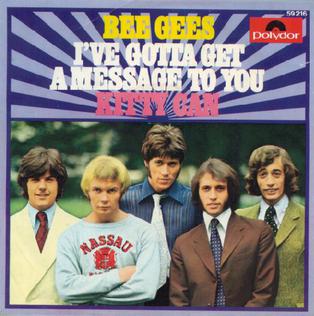
"I've Gotta Get a Message to You" is a song by the Bee Gees. Released as a single in 1968, it was their second number-one hit in the UK Singles Chart, and their first US Top 10 hit. Barry Gibb re-recorded the song with Keith Urban for his 2021 album Greenfields.
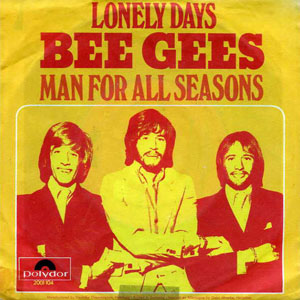
"Lonely Days" is a ballad written and performed by the Bee Gees. It appeared on their album 2 Years On, and was released as a single, becoming their first Top Five hit in the US, peaking at number three in the Billboard Hot 100 and reaching number one in the Cashbox and Record World charts. Barry Gibb later re-recorded the song with country quartet Little Big Town for his 2021 album Greenfields.

"World" is a song by the Bee Gees, released in 1967 as a single in the United Kingdom and Europe and then included on their album Horizontal the following year. Though it was a big hit in Europe, Atco Records did not issue it as a single in the United States, having just issued a third single from Bee Gees' 1st, "Holiday".
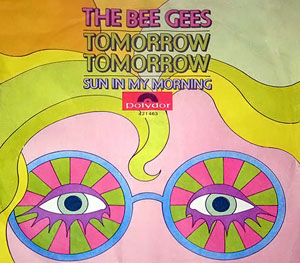
"Tomorrow Tomorrow" is a song by the Bee Gees written by Barry and Maurice Gibb. The song was originally intended to be recorded by Joe Cocker. It was the first Bee Gees single released after Robin Gibb had quit the group which was now down to a trio featuring Barry Gibb, Maurice Gibb, and drummer Colin Petersen.

Wallace Collection were a Belgian pop rock group active in the late 1960s and early 1970s. They are best known for their 1969 international hit "Daydream".

The Beatles (The Original Studio Recordings), also known as The Beatles: Stereo Box Set, is a box set compilation comprising all remastered recordings by English rock band the Beatles. The set was issued on 9 September 2009, along with the remastered mono recordings and companion The Beatles in Mono and The Beatles: Rock Band video game. The remastering project for both mono and stereo versions was led by EMI senior studio engineers Allan Rouse and Guy Massey. The Stereo Box also features a DVD which contains all the short films that are on the CDs in QuickTime format. The release date of 09/09/09 is related to the significance to John Lennon of the number nine.

The Ultimate Bee Gees is a compilation album released to coincide with the 50th anniversary of the Bee Gees. Although the group did not start recording until 1963 on Festival Records in Australia, they began calling themselves the "Bee Gees" in 1959 after several name changes such as "Wee Johnny Hayes and the Bluecats", "The Rattlesnakes" and "BG's". Each disc is themed with the first containing more upbeat songs, called A Night Out, and the second containing slower songs and ballads, called A Night In, though the cover art does not distinguish this theme. Liner notes were written by Sir Tim Rice. This also marks the return of the 1970s era logo on an official Bee Gees release, which was last used on the Bee Gees' 1983 single "Someone Belonging to Someone".
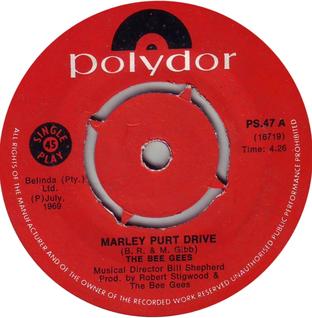
"Marley Purt Drive" is a song recorded by the Bee Gees, It was written by Barry, Robin & Maurice Gibb and released in March 1969 on the album Odessa. It was released in stereo in the United States in January and its mono version was released in the United Kingdom in March. The remastered version of this song was released on 27 February 2009 on Reprise Records.

"Saved by the Bell" is a 1969 single written and recorded by Robin Gibb. It was released in June 1969, and has been certified gold. It was the lead single on Gibb's debut album Robin's Reign, released in early 1970. According to Vinyl Records, the song was co-produced by Kenny Clayton. Gibb also made a promotional video for this song. The song gained commercial success in Europe, but was a commercial failure in the US.

"One Million Years" is a single released by Robin Gibb in 1969 with the B-side "Weekend". The single did not chart in Britain. Recorded during sessions for Robin's Reign it was only included on the German LP and CD version as the last track. Produced by Gibb with his new manager Vic Lewis. Kenny Clayton conducts the orchestra for this song.



















